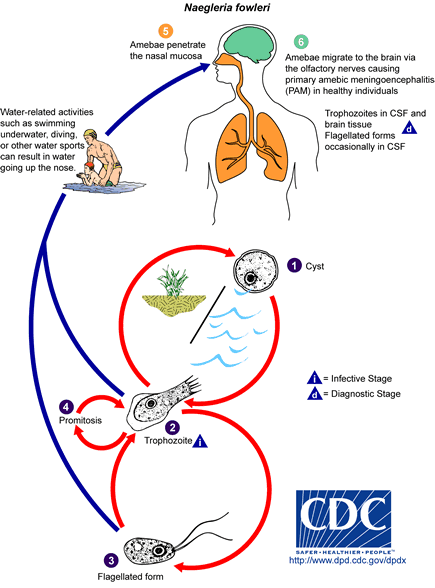Karachi health officials have reported the eighth case and fatality due to infection with the parasite, Naegleria fowleri late last week, according to a Pakistan news source.
The adult male died at a private hospital on Wednesday and it is believed he contracted the amoeba via domestic water use.

Director Health Karachi Dr Zafar Ejaz said, “There is no history that the deceased had gone for swimming or outside the area. Water tanks should be kept clean and citizens should at least use boiled and chlorinated water for washing their nose.”
The notification of the eighth fatality comes as the Karachi Water & Sewerage Board (KWSB) in cooperation with Sindh Health Department start a safety measure and precaution awareness campaign against Naegleria in the city.
The inauguration ceremony of the awareness campaign was attended by a large number of citizens.
KWSB Spokesperson Nazeer Mateen said the reason behind the campaign was to inform residents about prevention steps from naegleria by approaching them in their areas and educating them about the usage of sodium hypochlorite and chlorine tablets.
A large number of pamphlets comprising informative literature were distributed in the ceremony.
Naegleria fowleri (commonly referred to as the “brain-eating amoeba”), is a microscopic amoeba which is a single-celled living organism. It can cause a rare and devastating infection of the brain called primary amebic meningoencephalitis (PAM). The amoeba is commonly found in warm freshwater such as lakes, rivers, ponds and canals.
Infections can happen when contaminated water enters the body through the nose. Once the amoeba enters the nose, it travels to the brain where it causes PAM (which destroys brain tissue) and is usually fatal. Infections usually occur when it is hot for prolonged periods of time, which results in higher water temperatures and lower water levels.
Naegleria fowleri infections are rare. Most infections occur from exposure to contaminated recreational water. Cases due to the use of neti pots and the practice of ablution have been documented.
The practice of ablution is included in Yogic, Ayurvedic, and Islamic traditions. Within the Islamic faith, ritual nasal rinsing is included in a cleansing process called “wudu” or “ablution.” It is usually performed several times a day in preparation for prayer, according to the Centers for Disease Control and Prevention.
You cannot be infected with Naegleria fowleri by drinking contaminated water and the amoeba is not found in salt water.
Initial symptoms of PAM usually start within 1 to 7 days after infection. The initial symptoms may include headache, fever, nausea, or vomiting. Other symptoms can include stiff neck, confusion, loss ofbalance, seizures, and hallucinations. After the start of symptoms, the disease progresses rapidly. For more infectious disease news and information, visit and “like” the Infectious Disease News Facebook page
Related story: Neti pots, Naegleria and you


Outbreaks from neti pots were due to using contaminated water. Proper neti pot use involves distilled water and salt. The amoeba cannot live in salt water. A (distilled water) salt water neti pot rinse within a couple of hours after swimming in lake water is actually recommended as a precautionary measure.